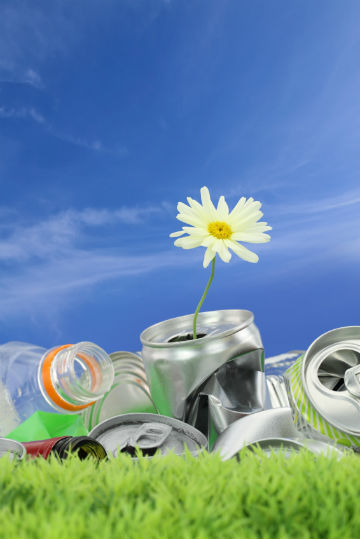
Believe it or not, there are some naysayers that are still against recycling. Whether they argue that recycling takes up too much time, energy or effort, some businesses and households have their reasons. Not to knock them, but here are a few of the most common excuses for not recycling, followed by why those arguments are not so reasonable.
When recycling first started, it was true that sometimes the transit took longer and caused more energy output and pollution than making a whole new product would have caused. But, that just isn’t the case anymore, especially as we develop more localized reprocessing facilities, markets and uses for all the materials that we recycle. These three outdated myths still stand (and are no longer correct):
There is no point in recycling because all the stuff just gets dumped.
Why this is wrong: Contamination is a concern, and it is true that one Pyrex plate or one crumb can ruin a whole bin. Technology has adapted to this. Many plastics and other contents are sorted mechanically at a materials recycling facility, or MRF. MRFs are pros — they split open mixed bags and the contents fly down conveyor belts, shoot through huge revolving drums, zoom under powerful magnets, get kicked around by air knives and then get zapped by a laser beam (or 10).
The process relies heavily on the beams to identify the type of plastic, and there is some old-fashioned handpicking as well. So, most items are not wasted; they are indeed recycled.
It causes excess pollution trucking recyclable materials around the country.
Why this is wrong: There are recycling centers all over the country that specialize in recycling different items. There is no need for a long transportation sequence anymore. To find a recycling center near you, search by ZIP code at
1800recycling.com/find.
It costs more to recycle than it does to throw trash away.
Why this is wrong: At one time, this was not a myth. But, now that landfills have been filled and closed, new taxes have been introduced. On a personal level, you can make what some may see as chump change, but 5 cents a can does add up quickly. Aluminum pays 25-90 cents by the pound, and its money-making effectiveness (minimal, but existent) was examined by the
Associated Press.
Choosing to recycle is as simple as seeing that we really are in need of a system that encourages us to reuse, not just throw away.
 Believe it or not, there are some naysayers that are still against recycling. Whether they argue that recycling takes up too much time, energy or effort, some businesses and households have their reasons. Not to knock them, but here are a few of the most common excuses for not recycling, followed by why those arguments are not so reasonable.
When recycling first started, it was true that sometimes the transit took longer and caused more energy output and pollution than making a whole new product would have caused. But, that just isn’t the case anymore, especially as we develop more localized reprocessing facilities, markets and uses for all the materials that we recycle. These three outdated myths still stand (and are no longer correct):
Believe it or not, there are some naysayers that are still against recycling. Whether they argue that recycling takes up too much time, energy or effort, some businesses and households have their reasons. Not to knock them, but here are a few of the most common excuses for not recycling, followed by why those arguments are not so reasonable.
When recycling first started, it was true that sometimes the transit took longer and caused more energy output and pollution than making a whole new product would have caused. But, that just isn’t the case anymore, especially as we develop more localized reprocessing facilities, markets and uses for all the materials that we recycle. These three outdated myths still stand (and are no longer correct):
 Believe it or not, there are some naysayers that are still against recycling. Whether they argue that recycling takes up too much time, energy or effort, some businesses and households have their reasons. Not to knock them, but here are a few of the most common excuses for not recycling, followed by why those arguments are not so reasonable.
When recycling first started, it was true that sometimes the transit took longer and caused more energy output and pollution than making a whole new product would have caused. But, that just isn’t the case anymore, especially as we develop more localized reprocessing facilities, markets and uses for all the materials that we recycle. These three outdated myths still stand (and are no longer correct):
Believe it or not, there are some naysayers that are still against recycling. Whether they argue that recycling takes up too much time, energy or effort, some businesses and households have their reasons. Not to knock them, but here are a few of the most common excuses for not recycling, followed by why those arguments are not so reasonable.
When recycling first started, it was true that sometimes the transit took longer and caused more energy output and pollution than making a whole new product would have caused. But, that just isn’t the case anymore, especially as we develop more localized reprocessing facilities, markets and uses for all the materials that we recycle. These three outdated myths still stand (and are no longer correct):